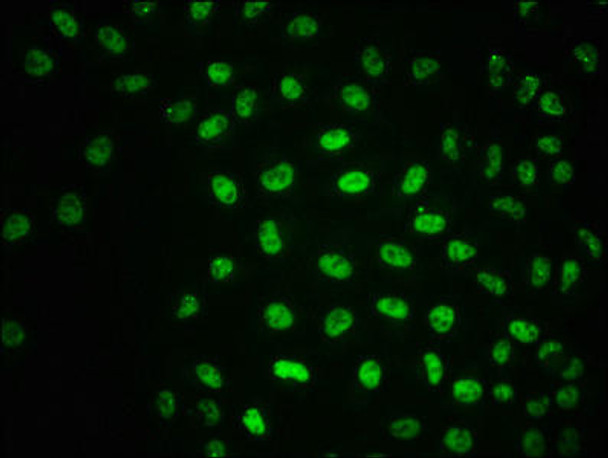| UniProt Protein Function: | Serine/threonine protein kinase which activates checkpoint signaling upon double strand breaks (DSBs), apoptosis and genotoxic stresses such as ionizing ultraviolet A light (UVA), thereby acting as a DNA damage sensor. Recognizes the substrate consensus sequence [ST]-Q. Phosphorylates 'Ser-139' of histone variant H2AX/H2AFX at double strand breaks (DSBs), thereby regulating DNA damage response mechanism. Also plays a role in pre-B cell allelic exclusion, a process leading to expression of a single immunoglobulin heavy chain allele to enforce clonality and monospecific recognition by the B-cell antigen receptor (BCR) expressed on individual B-lymphocytes. After the introduction of DNA breaks by the RAG complex on one immunoglobulin allele, acts by mediating a repositioning of the second allele to pericentromeric heterochromatin, preventing accessibility to the RAG complex and recombination of the second allele. Also involved in signal transduction and cell cycle control. May function as a tumor suppressor. Necessary for activation of ABL1 and SAPK. Phosphorylates DYRK2, CHEK2, p53/TP53, FANCD2, NFKBIA, BRCA1, CTIP, nibrin (NBN), TERF1, RAD9 and DCLRE1C. May play a role in vesicle and/or protein transport. Could play a role in T-cell development, gonad and neurological function. Plays a role in replication-dependent histone mRNA degradation. Binds DNA ends. Phosphorylation of DYRK2 in nucleus in response to genotoxic stress prevents its MDM2-mediated ubiquitination and subsequent proteasome degradation. Phosphorylates ATF2 which stimulates its function in DNA damage response. |
| NCBI Summary: | The protein encoded by this gene belongs to the PI3/PI4-kinase family. This protein is an important cell cycle checkpoint kinase that phosphorylates; thus, it functions as a regulator of a wide variety of downstream proteins, including tumor suppressor proteins p53 and BRCA1, checkpoint kinase CHK2, checkpoint proteins RAD17 and RAD9, and DNA repair protein NBS1. This protein and the closely related kinase ATR are thought to be master controllers of cell cycle checkpoint signaling pathways that are required for cell response to DNA damage and for genome stability. Mutations in this gene are associated with ataxia telangiectasia, an autosomal recessive disorder. [provided by RefSeq, Aug 2010] |
| UniProt Code: | Q13315 |
| NCBI GenInfo Identifier: | 575773389 |
| NCBI Gene ID: | 472 |
| NCBI Accession: | Q13315.4 |
| UniProt Secondary Accession: | Q13315,O15429, Q12758, Q16551, Q93007, Q9NP02, Q9UCX7 B2RNX5, |
| UniProt Related Accession: | Q13315 |
| Molecular Weight: | 350,687 Da |
| NCBI Full Name: | Serine-protein kinase ATM |
| NCBI Synonym Full Names: | ATM serine/threonine kinase |
| NCBI Official Symbol: | ATM |
| NCBI Official Synonym Symbols: | AT1; ATA; ATC; ATD; ATE; ATDC; TEL1; TELO1 |
| NCBI Protein Information: | serine-protein kinase ATM |
| UniProt Protein Name: | Serine-protein kinase ATM |
| UniProt Synonym Protein Names: | Ataxia telangiectasia mutated; A-T mutated |
| Protein Family: | ATM interactor |
| UniProt Gene Name: | ATM |


